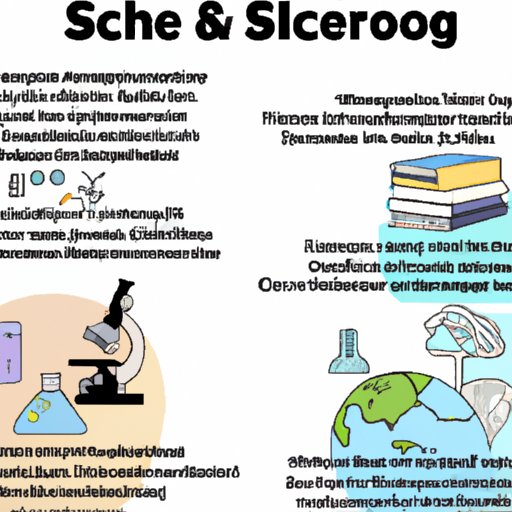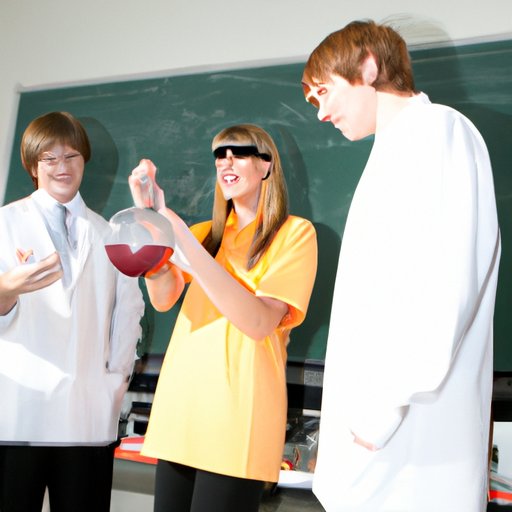Introduction
High school science classes are an integral part of a student’s education. These classes provide students with the opportunity to explore different scientific topics, develop skills in problem-solving and critical thinking, and gain a better understanding of the world around them. Science classes also introduce students to the fundamentals of scientific inquiry and help them develop knowledge they can apply to real-world situations.
For many students, high school science classes are a source of anxiety and dread. But with the right preparation and support, these classes can be both rewarding and enjoyable. In this article, we’ll explore the different types of high school science classes, what to expect from each one, and how to make the most of your experience.

Exploring the Different High School Science Classes: A Comprehensive Guide
High school science classes typically include biology, chemistry, physics, earth science, and environmental science. Each of these courses has its own unique focus and objectives, so it’s important to understand the differences between them before making a decision about which class to take.
Biology
Biology is the study of living organisms, including their structure, function, growth, evolution, and distribution. In high school biology, students learn about the characteristics of life, cell structure and function, genetics, and the diversity of species. They also explore topics such as ecology, human anatomy and physiology, and evolution.
Chemistry
Chemistry is the study of matter and its properties. In high school chemistry, students learn about the basics of chemical reactions, atomic structure, the periodic table, and the properties of elements. They also explore topics such as stoichiometry, thermodynamics, and chemical equilibrium.
Physics
Physics is the study of energy and matter and their interactions. In high school physics, students learn about the fundamentals of motion, force, energy, electricity, magnetism, and waves. They also explore topics such as optics, thermodynamics, and quantum mechanics.
Earth Science
Earth science is the study of the Earth and its systems. In high school earth science, students learn about the structure and composition of the Earth, plate tectonics, weather and climate, and the geologic history of the planet. They also explore topics such as oceanography, meteorology, astronomy, and environmental science.
Environmental Science
Environmental science is the study of the environment and how humans interact with it. In high school environmental science, students learn about human impact on the environment, natural resource management, and conservation. They also explore topics such as renewable energy, sustainable development, and climate change.
High School Science Classes: What to Expect and How to Prepare
High school science classes involve a lot of reading, writing, and problem-solving. Students must be prepared to work hard and stay organized if they want to succeed. Here are some tips for getting the most out of your high school science classes.
Course Requirements
High school science classes usually require students to read assigned texts, complete lab experiments, write reports, and take exams. It’s important to understand the requirements of each course and plan accordingly. Make sure to budget your time wisely and stay on top of assignments.
Learning Outcomes
Each high school science course has its own set of learning outcomes. It’s important to understand what is expected of you and how you will be evaluated. Ask your teacher or counselor for a list of learning outcomes and use it to create a plan for success.
Tips for Success
Taking high school science classes can be challenging, but there are some simple steps you can take to ensure success. First and foremost, stay organized. Create a schedule that allows you to manage your time efficiently and stick to it. Next, don’t be afraid to ask questions. Your teacher is there to help, so don’t be afraid to ask for clarification or additional information. Finally, take advantage of available resources. Many schools offer tutoring services, online resources, and study groups that can help you better understand the material.

Making the Most of Your High School Science Classes
High school science classes can be difficult, but with the right attitude and approach, they can also be incredibly rewarding. Here are some tips for making the most of your experience.
Developing Good Study Habits
Developing good study habits is essential for success in high school science classes. Take notes during class and review them regularly. Set aside time each day to review your notes and practice problem-solving. This will help you better understand the material and retain important information.
Finding Resources and Support
If you find yourself struggling, don’t be afraid to seek help. Talk to your teacher or counselor about available resources, such as tutoring services, online resources, and study groups. You can also reach out to friends and family members who may have experience or knowledge in the subject.
Utilizing Classroom Opportunities
Make the most of the classroom environment by asking questions and participating in discussions. This will give you a better understanding of the material and help you build relationships with your classmates. Additionally, pay attention to any extra credit opportunities offered by your teacher. This is a great way to boost your grade.
High School Science Classes: What You Need to Know
Before taking a high school science class, it’s important to understand the prerequisites and college requirements. Here are some things to consider.
Understanding Prerequisites
High school science classes often have prerequisites, such as prior coursework or proficiency in math or English. Be sure to check the prerequisites for each course and make sure you meet them. If you need help, talk to your teacher or counselor.
Examining College Requirements
Many colleges require students to take certain science classes in order to graduate. Before registering for a course, research the college requirements for your major or intended field of study. This will help you make sure you’re taking the right classes for your future.
Considering Career Paths
High school science classes can help you explore potential career paths. Research different fields and talk to your teacher or counselor about potential options. This will give you a better understanding of what you need to do to pursue your desired career.

Choosing the Right High School Science Class for You
It’s important to choose the right high school science class for you. Here are some tips for selecting the best course.
Researching Your Options
Take the time to research your options. Read course descriptions and talk to your teacher or counselor. Consider your interests and aptitudes and look for classes that align with them. This will help you make an informed decision.
Applying Your Interests
When selecting a high school science class, think about what interests you. Are you fascinated by the human body? Do you enjoy exploring the mysteries of the universe? Consider your passions and find a course that speaks to them.
Seeking Guidance
If you’re still unsure of which high school science class to take, don’t hesitate to ask for help. Talk to your teacher or counselor and get their advice. They can help you identify the best course for you based on your interests and goals.
Conclusion
High school science classes are an important part of a student’s education. These classes provide students with the opportunity to explore different scientific topics, develop skills in problem-solving and critical thinking, and gain a better understanding of the world around them. With the right preparation and support, high school science classes can be both rewarding and enjoyable. This comprehensive guide explored the different types of high school science classes, what to expect, how to prepare, and more. Now you know how to make the most of your course and choose the right class for you.
(Note: Is this article not meeting your expectations? Do you have knowledge or insights to share? Unlock new opportunities and expand your reach by joining our authors team. Click Registration to join us and share your expertise with our readers.)
